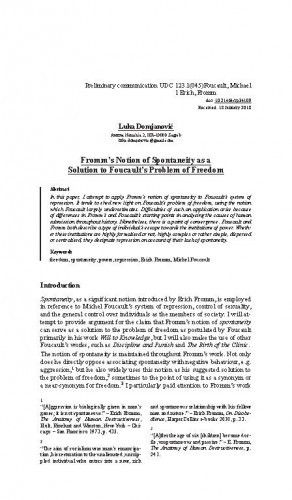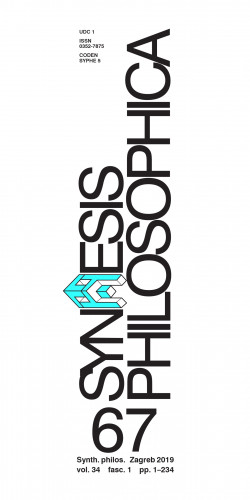In this paper, I attempt to apply Fromm’s notion of spontaneity to Foucault’s system of repression. It tends to shed new light on Foucault’s problem of freedom, using the notion which Foucault largely underestimates. Difficulties of such an application arise because of differences in Fromm’s and Foucault’s starting points in analysing the causes of human submission throughout history. Nonetheless, there is a point of convergence: Foucault and Fromm both describe a type of individual’s escape towards the institutions of power. Whether these institutions are highly formalised or not, highly complex or rather simple, dispersed or centralised, they designate repression on account of their lack of spontaneity.; U radu pokušavam primijeniti Frommov pojam spontanosti na Foucaultovu teoriju sustava represije. Ovom analogijom pokušava se iznova sagledati Foucaultov problem slobode, pomoću pojma koji Foucault uglavnom zanemaruje. Osnovna je teškoća takvog pristupa u različitim polazištima dvojice autora pri analizi uzroka ljudske podčinjenosti kroz povijest. Unatoč tome, članak će pokazati da je moguće pronaći točku konvergencije između Fromma i Foucaulta: oba autora opisuju svojevrsni bijeg pojedinca prema institucijama moći. Bilo da su te institucije formaliziranije ili rudimentarnije, raspršene ili centralizirane, zajednička im je osnova represija utemeljena na izbjegavanju bilo kakve spontanosti.; Dans cet article, je tente d’appliquer la notion de spontanéité de Fromm au système répressif de Foucault. Par cette analogie, nous cherchons à éclairer de nouveau le problème de la liberté chez Foucault, en utilisant la notion que Foucault sous-estime largement. Les difficultés d’une telle application sont dues à la différence des points de départ de Fromm et de Foucault dans l’analyse des causes de la soumission humaine à travers l’histoire. Néanmoins, les deux auteurs ont un point de convergence : Foucault et Fromm décrivent tous deux un type de fuite de l’individu vers les institutions du pouvoir. Que ces institutions soient hautement formalisées ou non, très complexes ou plutôt simples, dispersées ou centralisées, elles désignent la répression en raison de leur manque de spontanéité.; In diesem Artikel versuche ich, Fromms Begriff der Spontaneität auf Foucaults Unterdrückungssystem anzuwenden. Er neigt, ein neues Licht auf das Problem der Freiheit bei Foucault zu werfen, indem er den Begriff verwendet, den Foucault weitgehend vernachlässigt. Schwierigkeiten bei einer solchen Anwendung ergeben sich aus dem Unterschied zwischen Fromms und Foucaults Ausgangspunkten bei der Analyse der Ursachen für menschliche Unterwerfung im Laufe der Geschichte. Nichtsdestotrotz haben die Autoren einen Punkt der Konvergenz: Sowohl Foucault als auch Fromm beschreiben eine Art der Flucht des Individuums zu den Institutionen der Macht. Unabhängig davon, ob diese Institutionen hoch formalisiert oder nicht, hochkomplex oder eher einfach, verstreut oder zentralisiert sind, stehen sie für Unterdrückung infolge mangelnder Spontaneität.
Sažetak

 Synthesis philosophica : 34,1(2019) / editor-in-chief Ante Čović.
Synthesis philosophica : 34,1(2019) / editor-in-chief Ante Čović.